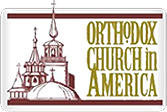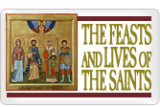Archbishop Demetrios' 10 Suggestions for Lent
By His Eminence Archbishop Demetrios, Greek Orthodox Geron of America.
1. Meditate on the History of Salvation
Think of the Lenten period as a time of meditating on the history of salvation. Think about the creation of the universe and of Adam and Eve as the beginning of human life. Think about the fall of Adam and the entrance of sin in humanity. We see in the hymnology of the liturgical book of Lent, the Triodion, constant references to the tragedy of the fall of the first human beings. Think of the current condition of the world with its confusion, violence, poverty, injustices, oppression, sickness and death, and remember it all started way back with Adam and Eve as a consequence of their sin and fall. But then contemplate how the amazing act of God Himself to become a human being radically changed everything. So in the course of Lent remember the history of salvation: From the fall of humankind, to the promise of redemption, the Incarnation of God as the new Adam, His Crucifixion, the Resurrection, the Ascension into Heaven, and the Second Coming.
2. Review the understanding of fasting
Take fasting seriously as an important aspect of Lent. Think of fasting not simply as an item of diet, but as something related to the fall of humankind, and at the same time as a victory through Christ. We fast for 40 days in Lent before Holy Week not merely as an exercise, an ascesis [i.e. self-discipline], but also because there is an important Christological meaning in fasting. We have 40-day fasting in both the Old and New Testaments. In the Old Testament, Moses fasted for 40 days on Mount Sinai before receiving the Ten Commandments (Exodus 34:28) and Prophet Elijah fasted for 40 days on Mount Horeb (3 Kingdoms 19:8). Both of these instances are connected with an encounter with God at the end of their fasting. In the New Testament, we have the 40-day fasting in the desert by our Lord Jesus Christ (Luke 4:1-13). At the end of His 40-day fasting, there were the “Temptations” of Christ, the first of which is related to eating: And the tempter came and said to him, “If you are the Son of God, command these stones to become loaves of bread.” But He [Christ] answered, “It is written, ‘Man shall not live by bread alone, but by every word that proceeds from the mouth of God’” (Matt. 4:3-4). Is this event in the life of Christ connected to the Fall of Adam? Indeed, the Fall of Adam was caused by an eating situation, yet the victory of Christ also happened through an eating situation. While Adam said “yes” to the temptation and ate (Genesis 3:1-6), Christ said “no” to the temptation and did not eat. This is why fasting for 40 days during Lent is not simply a matter of abstaining or an issue of diet, but is a major Christological and soteriological [the theology of salvation] situation: the fall of humankind, and then the restoration through the victory of Christ.
3. Reconsider our life of prayer
Great Lent is a special time to pray. But what is the content of our prayer? For some people, their prayer is still on the same level as when they were ten or fifteen years old; it has stayed undeveloped. What efforts are we making to improve our prayer in terms of content and expression? Looking at the Triodion, we see many examples of different types of prayer language and content. Try to pray and study the prayers that the Church has given us which are superb examples of conversing with God and try especially to prayerfully read the Psalms, the standard and universal book of prayer. During Lent we find an increased number of opportunities for community prayer and worship. The Church invites us each week to pray the services of the Divine Liturgy of St. Basil, the Presanctified Liturgy, the Salutations to the Theotokos, the Great Compline, and others. So try to pray more frequently this Lent and develop through constant praying a more refined language of prayer.
4. Be conscious of the gravity of sin
Sometimes we don’t take sin seriously. Yet Scripture offers a very strong picture of the gravity of sin. The hymnology of the Triodion is full of occurrences of the word “sin” or variations of it. Sin is a very serious issue. In the Hebrew Old Testament, there are fourteen different words to describe sin, but chiefly four: sin as a matter of human weakness, sin as a distortion or perversion, sin as a rebellion (borrowed from the political realm), and sin as an error or mistake related to ignorance. If we believe in God becoming a human being and willingly being crucified on the Cross for the sins of the world, then we must understand the seriousness of sin. Let’s reflect on how sin has control in our lives, and how it has distorted the divine image within each of us. But then remember that God has given forgiveness as the perfect antidote through the Cross. Forgiveness, however, is inseparably connected to repentance.
5. Make Lent a season for repentance
Along with sin, we are called to reflect upon repentance. Repentance is important in our lives and is a dominant theme throughout the Triodion. We should not forget that Christ began His public ministry with the words, “Repent [change your mind], for the kingdom of heaven is at hand” (Matt. 4:17). The whole Sermon on the Mount is a commentary on repentance. The writings of St. Paul and other New Testament writings are permeated by calls to repentance. Repentance is not merely a shallow act, but a radical change of mind, soul, will and mentality. It is an essential component of the Lenten period. God is always ready to forgive, but first we must repent.
6. Reflect on our reading of the Bible
Lent is a time to reflect on our relationship with the Holy Scriptures, because the Bible is central in the texts of the Triodion. We must always keep the biblical element at the forefront in our worship and in our life. Most people think about the Bible only at the reading of the Epistle and Gospel at the Divine Liturgy. We as Christians should have the Word of God as a central guide in everything we do. Lent assists us to come more frequently to the Bible and encourages us to reflect upon Scriptures. Try to make reading the Holy Bible a daily practice during this Lent and beyond.
7. Be aware of the Christocentric focus
The greatest focus of Lent should be on Jesus Christ Himself. Sometimes we get caught up in fasting, saying prayers, going to Church, on our sins, or in the rituals of this holy season; yet in the midst of all we do, we forget about Jesus Christ Himself. Lent is, above all, a time to draw closer to Christ! Christ is the center of Lent and should be the center of our lives. As we go through Lent and arrive at Holy Week with the Crucifixion and Resurrection, Christ must be at the beginning, middle, and end of all things. Lent is an opportunity to come closer to Christ, and to be Christocentric in all that we think, say, or do. What does our incarnate God offer to us as the ultimate possibility of union with Him? He gave us His Body and His Blood. He said, “He who eats my flesh and drinks my blood abides in me, and I in him” (John 6:56). Here is the ultimate paradox: During Lent, abstinence from food, i.e. fasting, is accompanied by partaking of the imperishable food, i.e. the Body and Blood of Christ. This is more than being Christocentric. This is having Christ dwelling in us in a palpable [i.e. tangible] way.
8. Cultivate human relationships
Lent is also an opportunity to cultivate our human relationships in more authentic ways. In the hymnology of the Triodion there is an emphasis on loving and caring for each other, moving away from evil and wrong things, forgiving one another, and being reconnected with our fellow human beings. The Book of Isaiah, read in its entirety during Lent, begins with a condemnation of the people of Israel because they had abandoned God, and then continues with an admonition to the Israelites to return to God and to establish proper relationships with their fellow human beings. So we are called to think of any relationships that are not in the proper condition and make every effort to remedy them. This is an integral part of living our lives during Lent.
9. Practice almsgiving
Almsgiving is a vital aspect of Lent. On one of the many occasions speaking about the need to be a person who takes care of others, St. John Chrysostom said that we are all called to give alms. He continued to say that even those who claim to be poor are not free from offering alms. Poverty is a poor excuse not to give. Indeed there are poor people who give the half of what they have (Mark 12:41-44). It could be said that almsgiving is a requirement for living our life as Christians. Christ said, “when you give alms” (Matt. 6:3), not if you give alms. Almsgiving is especially emphasized during the Lenten period.
10. Make this Lent a time for transformation
Ultimately, our Lenten season is a time of having a transformative experience. We are challenged to resolve that at the end of the Lenten period, when we celebrate Pascha, we are different from what we are today. The transformative aspect of Lent is an absolute necessity for spiritually enjoying this season. We are in the process of transformation if we steadily become Christocentric in all things, through the grace and power of our Lord Jesus Christ. This Lenten season provides us with a tremendous possibility to prepare spiritually, to be constantly transformed, and to be with Christ in His Passion and Resurrection.





